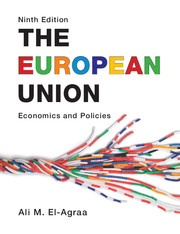Book contents
- Frontmatter
- Contents
- Figures
- Tables
- Boxes
- Contributors
- Preface
- A reader’s guide
- Abbreviations
- 1 General introduction
- Part I EU history, institutions and legal dimension
- Part II EU market integration
- Part III EU monetary integration
- Part IV The single European market
- 13 Competition policy
- 14 Industrial and competitiveness policy
- 15 Tax harmonization
- 16 Transport policy
- 17 Energy policy and energy markets
- 18 Environmental policy
- Part V EU budget and structural policies
- Part VI EU external relations
- Part VII The future of the EU
- Bibliography
- Author Index
- Index
- References
13 - Competition policy
from Part IV - The single European market
- Frontmatter
- Contents
- Figures
- Tables
- Boxes
- Contributors
- Preface
- A reader’s guide
- Abbreviations
- 1 General introduction
- Part I EU history, institutions and legal dimension
- Part II EU market integration
- Part III EU monetary integration
- Part IV The single European market
- 13 Competition policy
- 14 Industrial and competitiveness policy
- 15 Tax harmonization
- 16 Transport policy
- 17 Energy policy and energy markets
- 18 Environmental policy
- Part V EU budget and structural policies
- Part VI EU external relations
- Part VII The future of the EU
- Bibliography
- Author Index
- Index
- References
Summary
Introduction
The main purpose of competition policy is generally seen as protecting the market mechanism from breaking down. It does so by promoting competitive market structures and policing anti-competitive behaviour, thereby enhancing both the efficiency of the economy as a whole and consumer welfare in particular. In the EU this objective is pursued by means of enforcing prohibitions against (1) anti-competitive agreements between different companies, as well as against (2) anti-competitive behaviour by companies that are large enough – either individually or jointly – to harm competition by means of independent behaviour, and (3) by vetting mergers between previously independent companies to verify whether these are likely to result in non-competitive market structures.
EU competition policy has three important characteristics that are not commonly found elsewhere. First, it not only aims to protect the competitive process as such, but also to promote and protect market integration between EU member states (MSs). Second, apart from addressing private distortions of competition, it also curbs distortions of the market process by its MSs, notably as a result of state aid. Both result from the third distinguishing feature of EU competition policy: it is implemented in a multi-level political system, that of the EU and its MSs. In this context, it is worth noting that although until recently the application of EU competition rules was highly centralized in the hands of the European Commission (Commission), due to its exemption monopoly for agreements infringing the cartel prohibition, this changed fundamentally in May 2004. A decentralized system based on enforcement by (and coordination between) the twenty-seven national competition authorities (NCAs) was moved into place. All these aspects are examined further below.
- Type
- Chapter
- Information
- The European UnionEconomics and Policies, pp. 197 - 213Publisher: Cambridge University PressPrint publication year: 2011



